June 2024 Climate Summaries
Mobile Alabama and Pensacola Florida Area
National Weather Service Mobile Alabama
July 3, 2024
June 2024 in Review - The first few days of the month started off on the wet side. With increased cloud cover too, a notable resultant dip in daily highs were well below normal for the start of the month at Mobile and Pensacola. Highs at Mobile transitioned to the warm side, north of June climatological means for the remainder of the month. The warmest peaks were during the middle and later end of the month when highs averaged 5° above normal from the 7th to the 15th and 4.4° above normal from the 21st to the 30th. Over 83% of the month saw daily highs at or above 90° or 25 days of occurrence; this was well above the normal June days of occurrence of 90° and higher at 15.7. Overnight lows at Mobile were also above normal by a little over a couple degrees on average. No record temperatures were reached at Mobile. Precipitation was below normal by shy of two inches.
After the first few days of below normal highs at Pensacola, highs recovered and straddled near the June normal for the remainder of the month. There were 13 days of the the month that saw daily highs at or above 90° which was just about normal for the month at 13.7 days; Lows were close to normal on average. There was one record temperature matched and that came on the 26th when the night-time low only settled to 80° and tied the previous high low temperature set in four other years for the date. June opened up excessively wet at Pensacola, when nearly half of the monthly rainfall fell on June 1st, breaking a one day record.
The tropics have started off in overdrive with three named storms already in the books. Tropical Storms Alberto and Chris formed in the Bay of Campeche within the typical June climatological origin area in the Gulf of America. Atypical for June however was the development of the Atlantic Basin's first hurricane, that being Major Hurricane Beryl late in the month which formed June 30th at low latitudes east of the Caribbean Sea's Windward Islands. Beryl stands as the first hurricane and of this intensity to form that far east, this early in the season within the Main Development Region over the central tropical Atlantic, surpassing Allen in 1980 by a little over a month.
Mobile Alabama Area [Climate Normal Period 1991-2020, Climate Record Period 1872 to Present]- The average monthly high of 92.2° was 2.8° above normal. There were 25 days of occurrence of 90° or higher or 9 days more than climatology. The average monthly low was 73.2° or 2.4° above normal. The average monthly temperature of 82.7° was 2.6° above normal. The highest temperature for the month was a toasty 98° on the 25th which was 8° above the normal for this date. The lowest temperature for the month, 66°, occurred on the 8th, 4° below the normal for the date. No record temperatures were reached. (Fig. A) shows a graphical representation of how the Mobile area temperatures compared to the seasonal normal daily highs and lows, which are shown by the colored dashed lines. Bar graphs reflecting the daily high/low temperature departures from normal are provided in the table below (Figs. B and C). The rain gauge collected 4.79" for the month (Fig. D), 1.76" below normal for June. The annual rainfall total ending June 30th at 33.91" is very close to normal (Fig. E).
June top records for the month during the Period of Record for the Mobile Area:
Click on the Mobile Alabama area climate graphics below to expand:
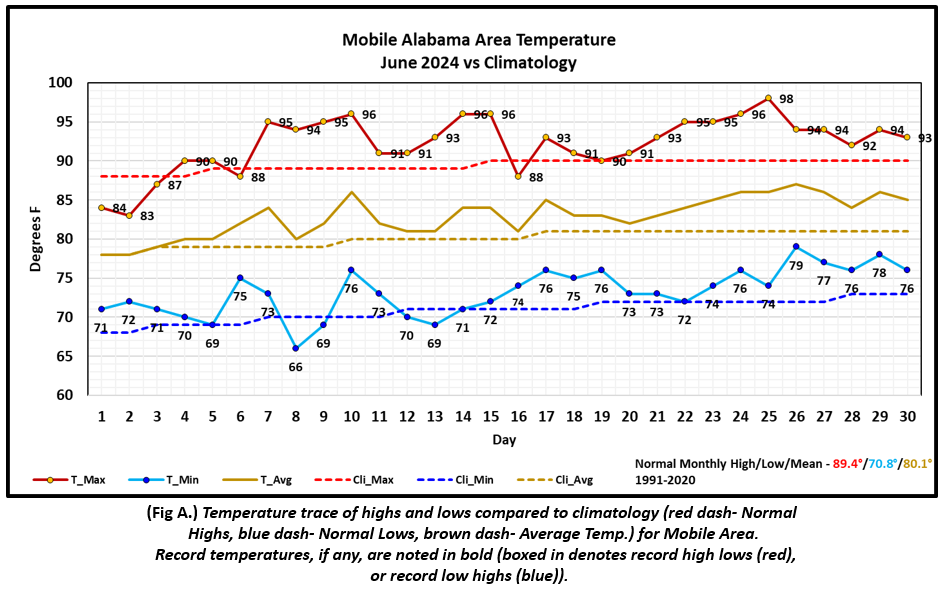
|
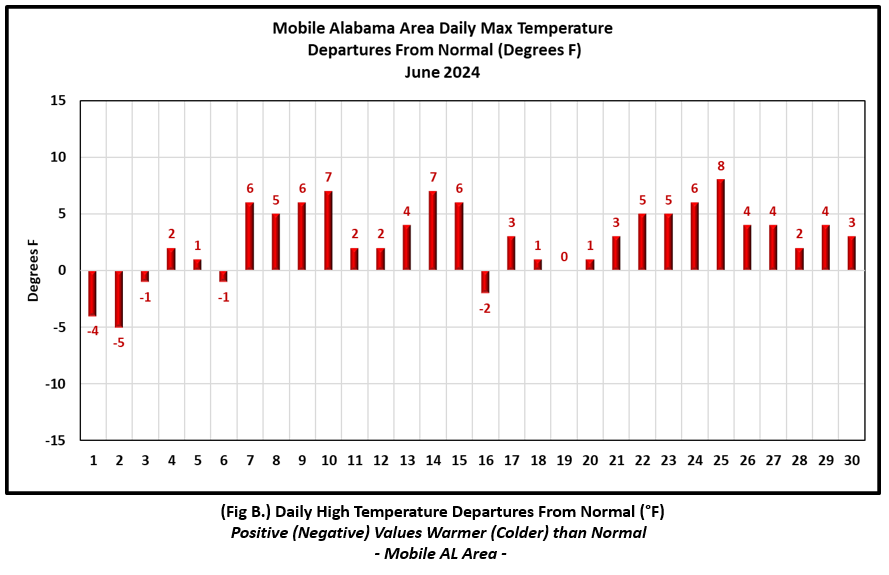
|
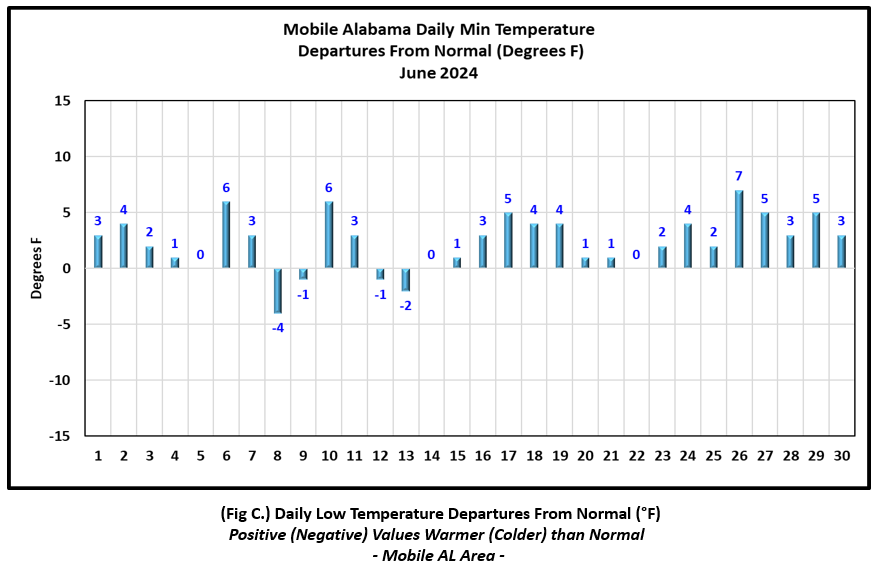
|
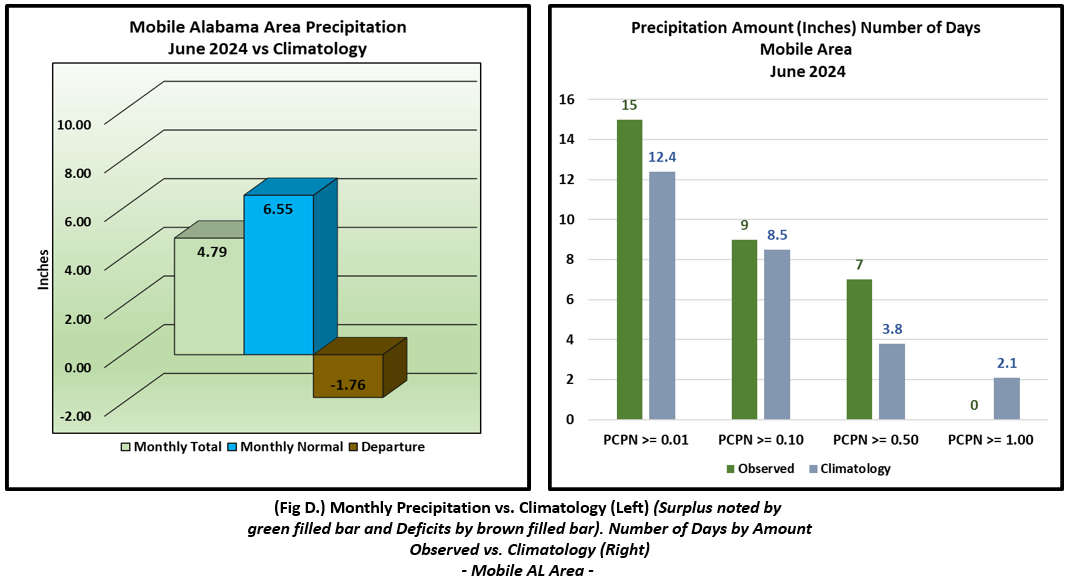
|
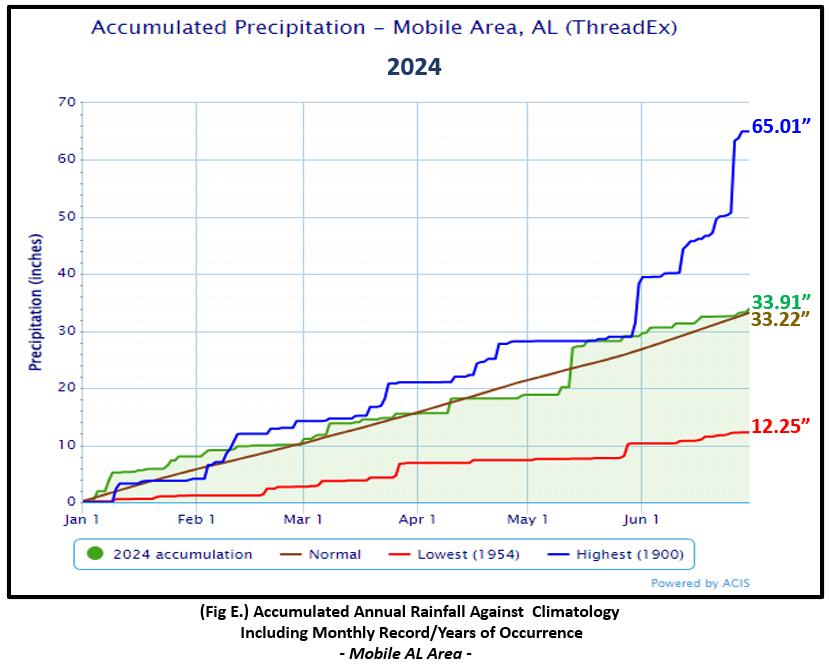
|
Pensacola Florida Area [Climate Normal Period 1991-2020, Climate Record Period 1879 to Present] - The average monthly high of 88.8° was 1.2° below normal. The average monthly low was 74.1° or 0.6° above normal. The average monthly temperature of 81.5° was 0.2° below normal. The highest temperature for the month was 93° on the 13th and 26th, 3 and 2° above the normal for these dates respectively. The lowest temperature for the month, 69° occurred on the 1st, 2° below the normal for this date. There was one record temperature, when a record high low of 80° on the morning of the 26th tied the previous occurrences in four other years on this date in 1932, 1911, 1905, and 1902. (Fig. F) shows a graphical representation of how the Pensacola area temperatures compared to the seasonal normal daily highs and lows, which are shown by the colored dashed lines. Bar graphs reflecting the daily high/low temperature departures from normal are provided in the table below (Figs. G and H). The rain gauge collected 8.45" for the month or 1.13" above normal. (Fig. I). Nearly half of the monthly total rainfall occurred on June 1st, when 3.99" filled the rain gauge, setting a new daily record surpassing 2.77" back in 1946. The annual rainfall total ending June 30th at 33.12" is in surplus by 1.33" (Fig. J).
June top records for the month during the Period of Record for the Pensacola Area:
Click on the Pensacola Florida area climate graphics below to expand:
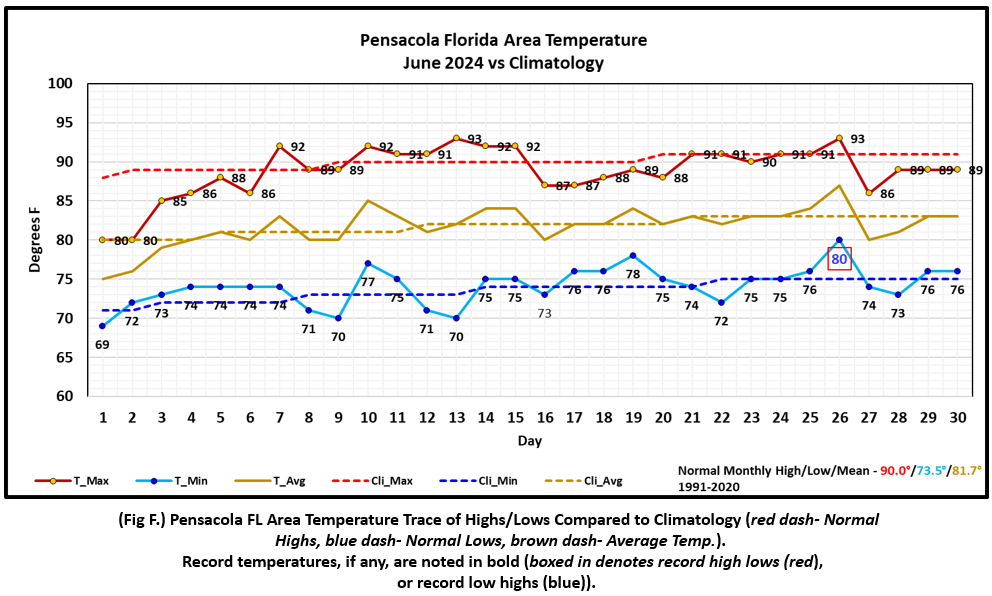
|
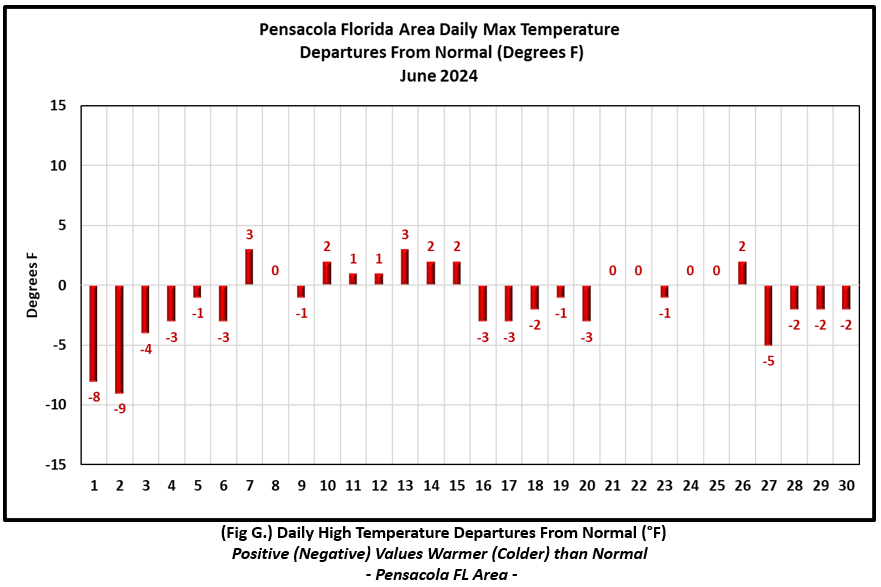
|
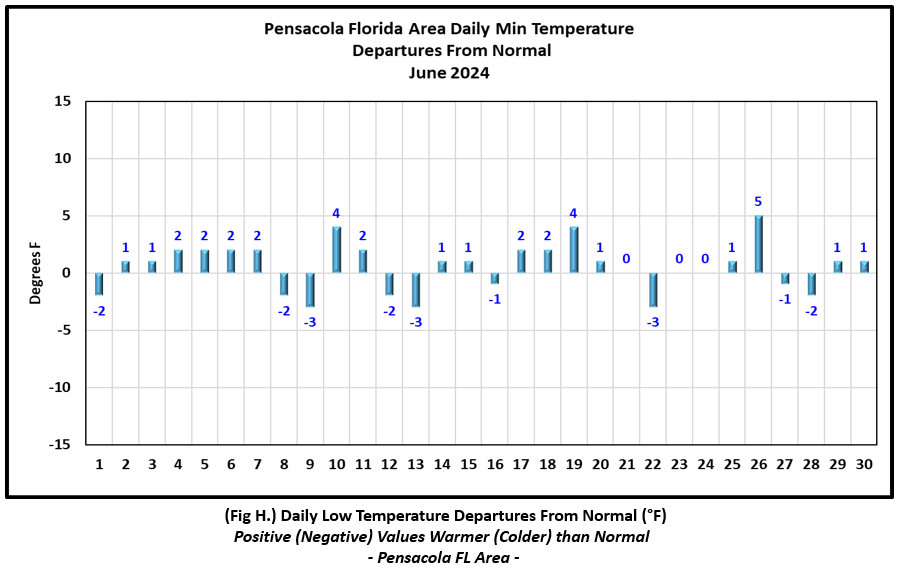
|
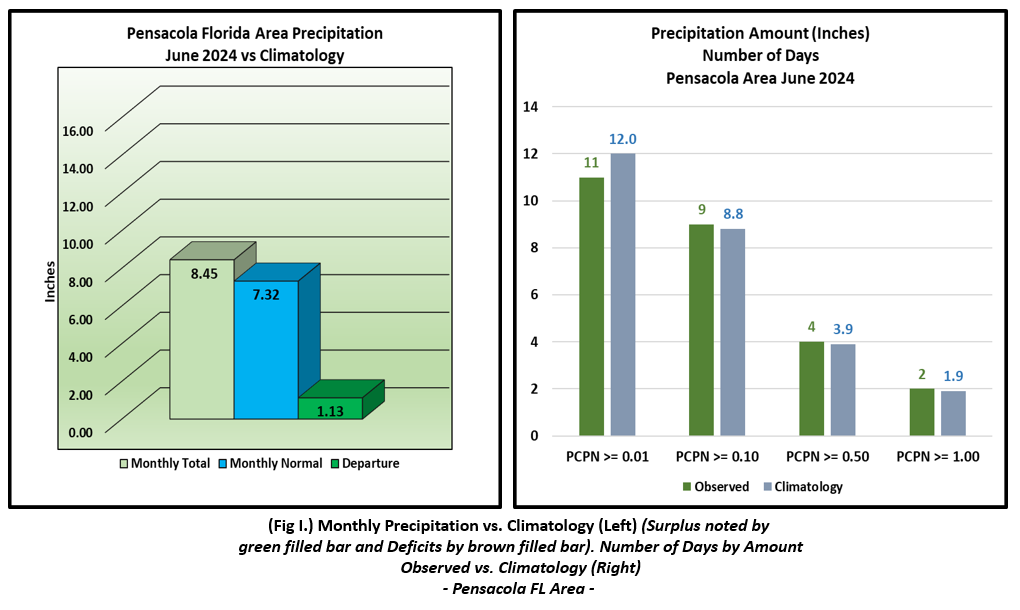
|
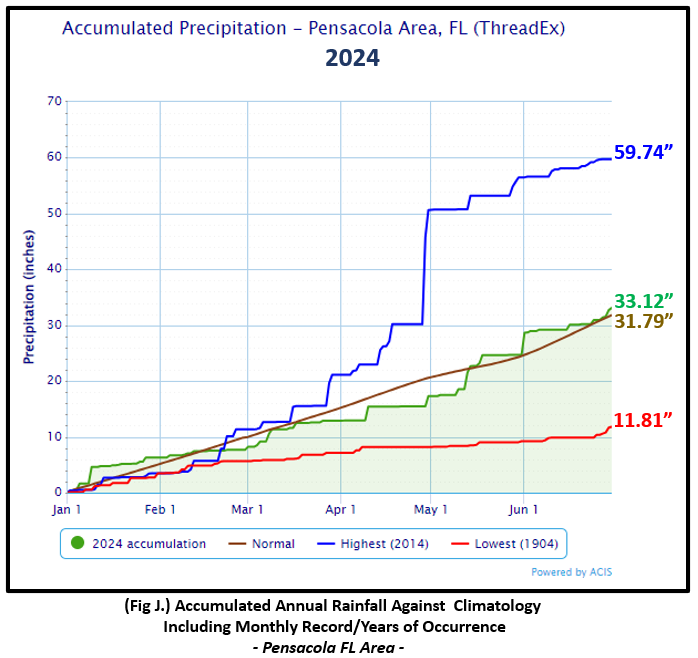
|
Additional June 2024 Climatology and Topics
Higher rainfall amounts were mostly focused along the coastal counties, with isolated pockets within the heavier rainfall footprint over 10" and 2 to 5" above normal. Otherwise, much of the area was short on normal June rainfall. (Fig. K) shows the areal monthly rainfall total, (Fig. L) shows the areal rainfall departures from normal and (Fig. M), the areal percent of normal rainfall. Areal average temperatures are provided in (Fig. N). The latest June 2024 monthly summary for Eglin Air Force Base (AFB) - KVPS has been received and provided in the table below. The temperatures in the daily tables consists of numbers both in °F/°C. Data courtesy of Mr. David Biggar, Staff Meteorologist, 96th Weather Squadron. Provided by permission.
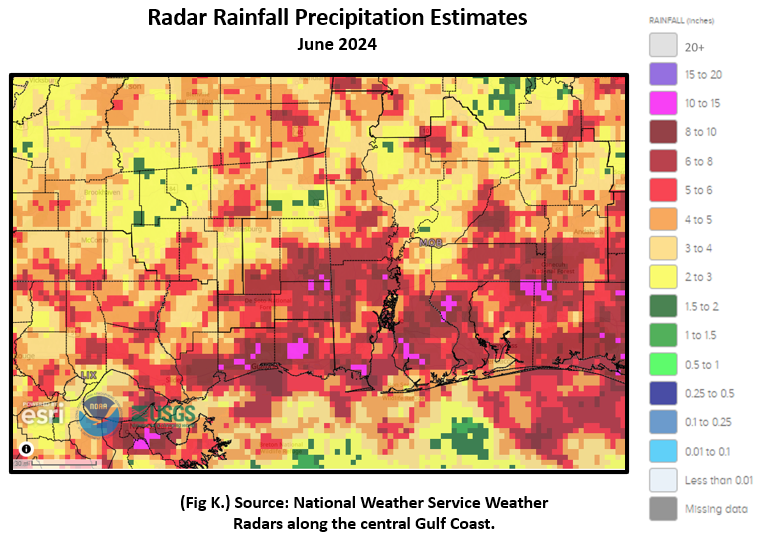
|
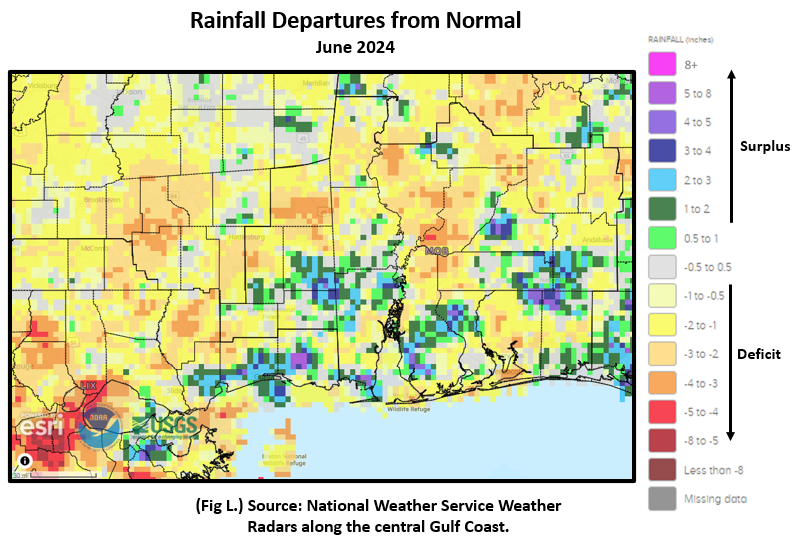
|
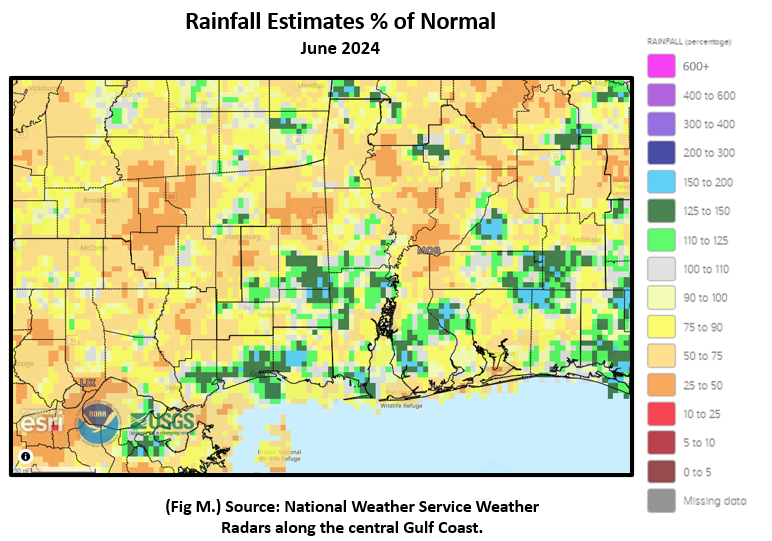
|

|
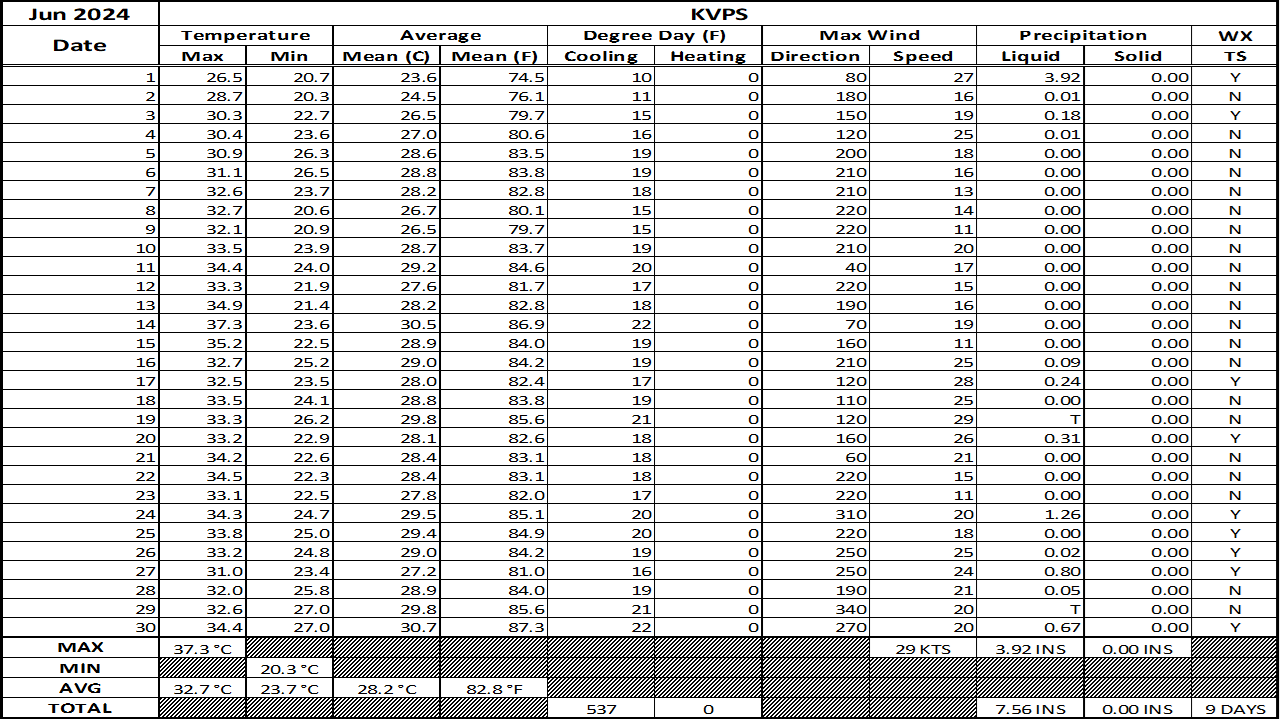
|
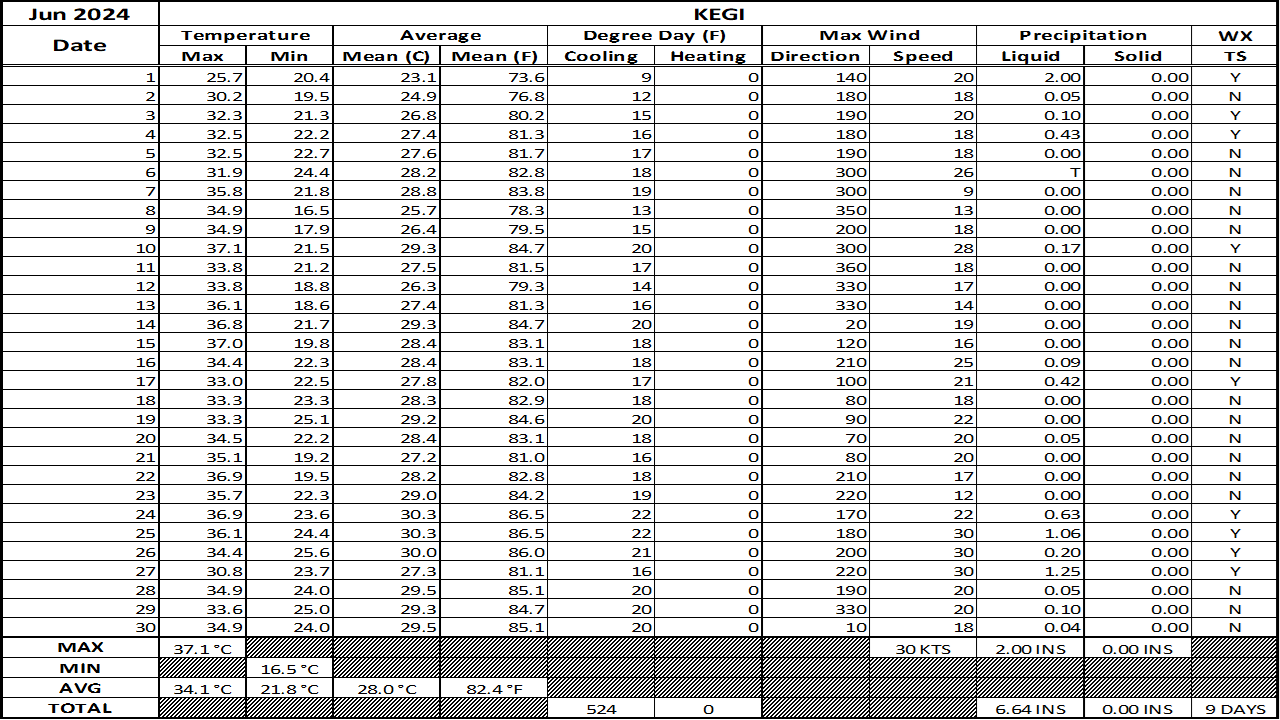
|
July 2024 Climatology, Seasonal Climatology and Outlooks:
Summer is in full force with July temperatures favored at a 60%+ probability or likely above normal for the deep south. Precipitation is favored to lean above normal with a bit better probability of above normal precipitation focused over the southeast US coast down across Florida. At the beginning of month two in the Atlantic Basin Hurricane Season, typical development of new systems for July begins to expand eastward to the western Atlantic and the Caribbean. Lending to the 2024 outlook for above normal tropical cyclone numbers is a number of favorable factors, including near-record warm oceanic temperatures in the Atlantic Ocean, development of La Niña conditions in the Pacific, reduced Atlantic trade winds, less wind shear and an above normal west African Monsoon which can produce well defined African easterly waves moving off west African coast and across the central Atlantic's Main Development Region (MDR). We also continue in the warm phase of the Atlantic Multi-Decadal Oscillation which is also a prominent link in the active tropical cyclone era we are in. See the link to the outlook below. It's highly encouraged to review your hurricane preparedness. Click on the Preparedness Tab on the NWS Mobile Tropical Webpage.
Click on the snap shots below to expand:
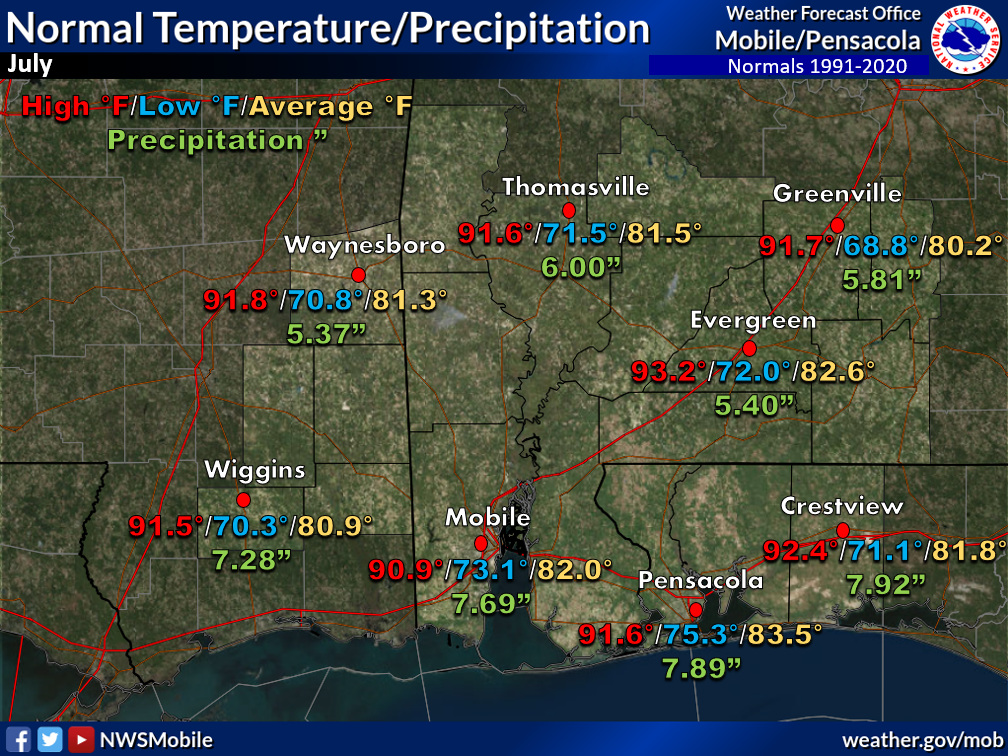 July Normals July Normals |
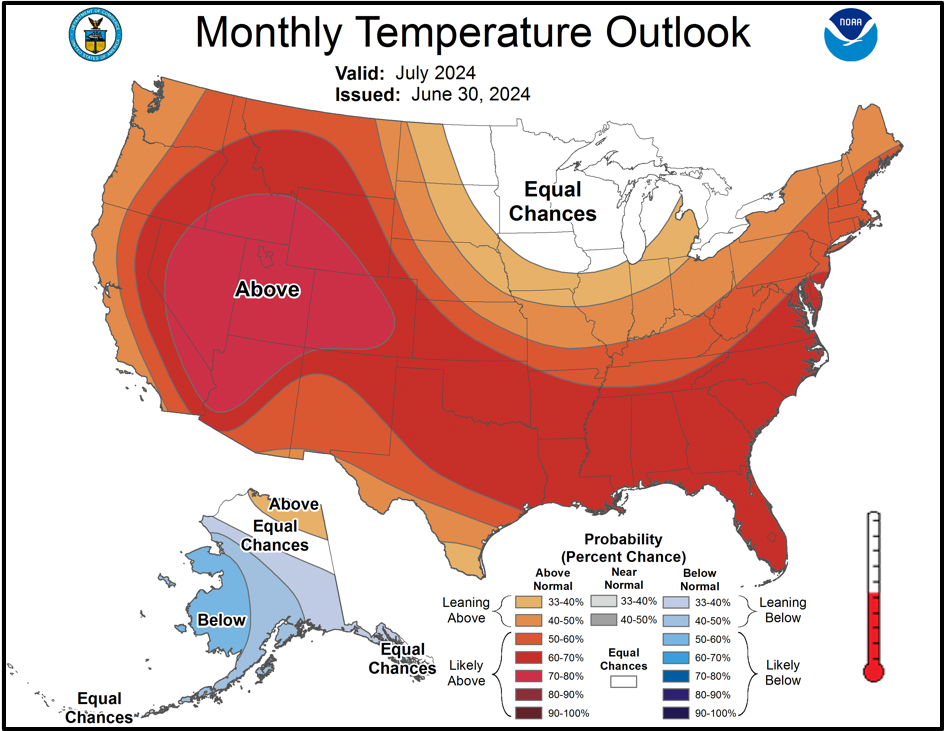
|
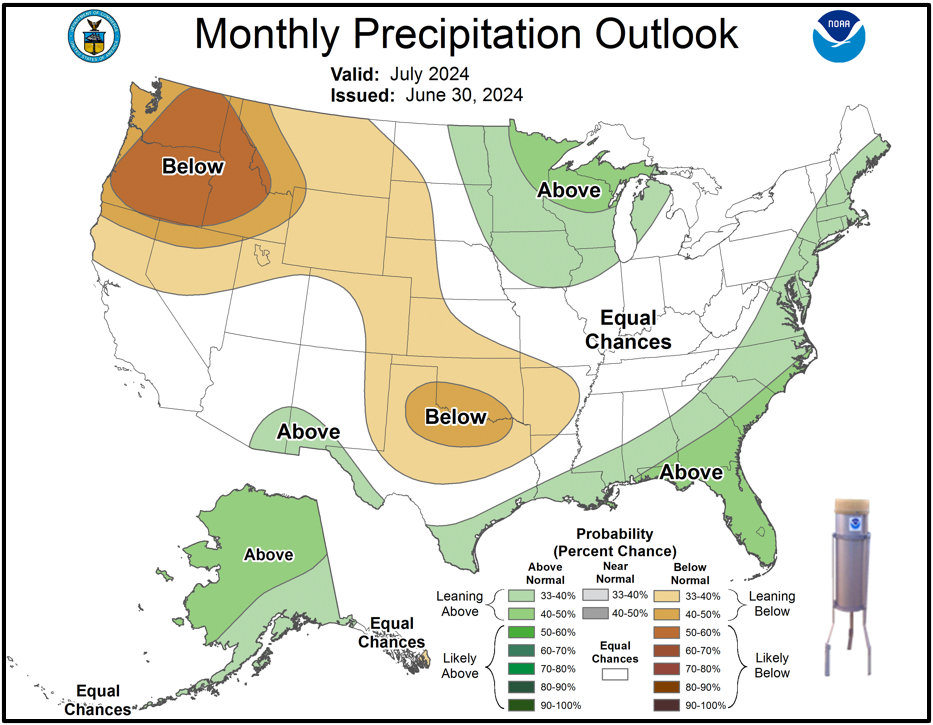
Outlook |

|
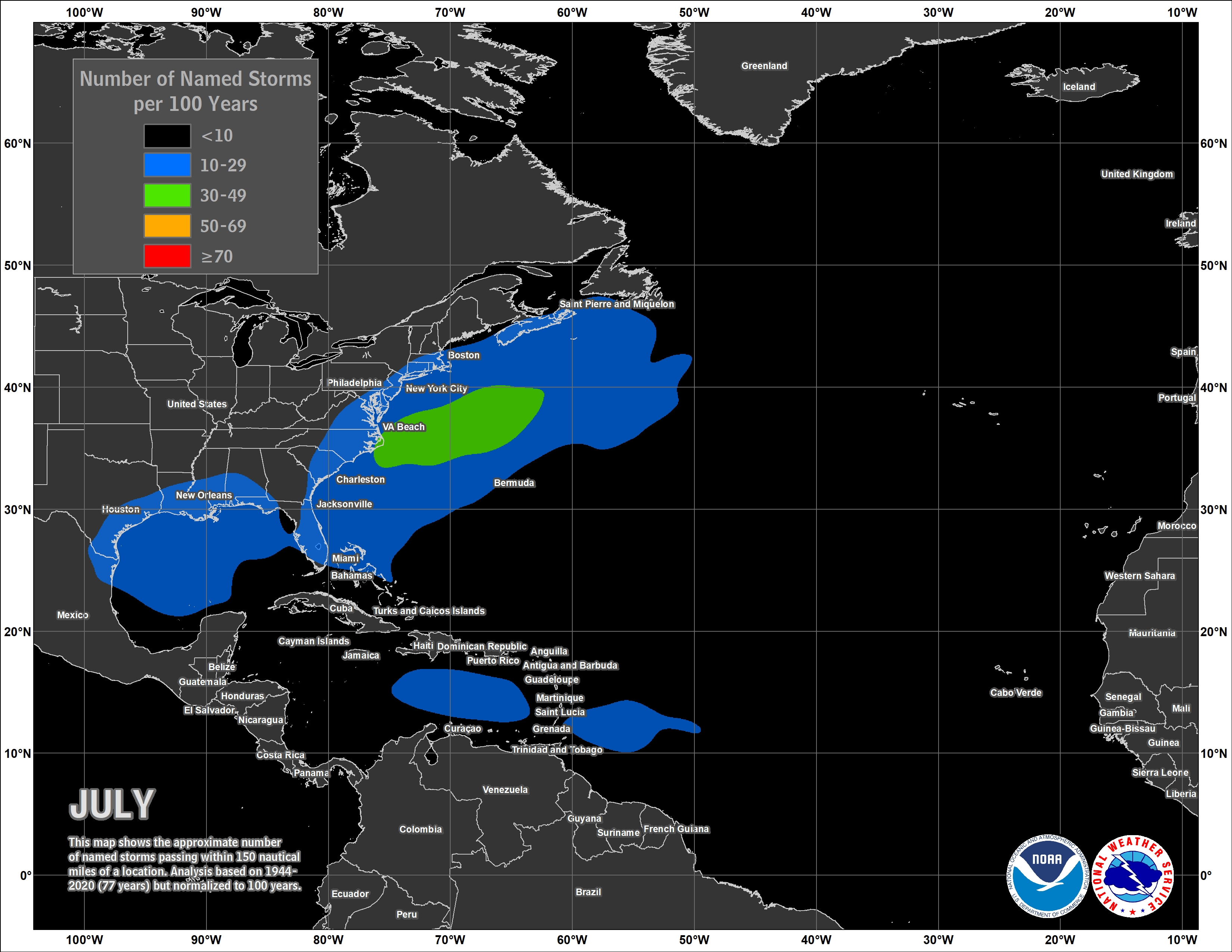
|

|
Additional Climate Links:
The National Weather Service Mobile Alabama's Climate and Past Weather page provides climate data at your fingertips for many observation points in the local forecast area by accessing the NOWData tab as well as many other climate resources. The Climate Prediction Center Link provides short and longer range climatic outlooks and education about the larger scale global circulations that impact temperatures and weather. With the large agriculture and farming presence along the central Gulf coast, the Drought Monitor link provides updates on drought trends and impacts. Another very helpful resource is the Community Collaborative Rain Hail and Snow (CoCoRaHS) network, which is a large group of volunteers working together to measure and map precipitation (rain, hail, and snow). The aim of CoCoRaHS is to provide the highest quality data for natural resource, education and research applications. You can be a part of the CoCoRaHS team by becoming a volunteer rainfall observer.